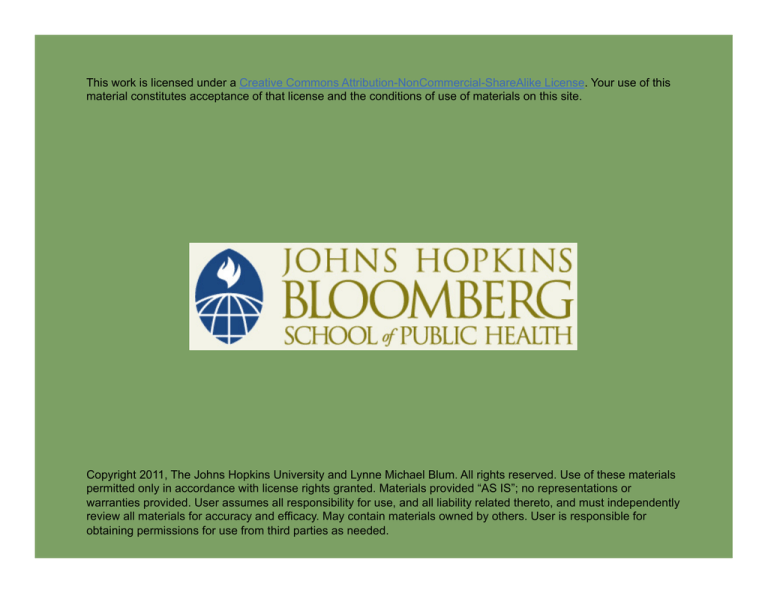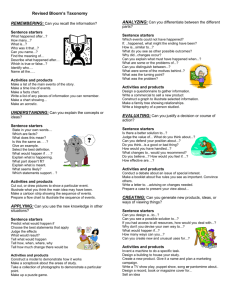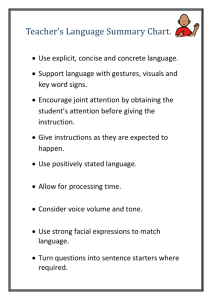
This work is licensed under a Creative Commons Attribution-NonCommercial-ShareAlike License. Your use of this
material constitutes acceptance of that license and the conditions of use of materials on this site.
Copyright 2011, The Johns Hopkins University and Lynne Michael Blum. All rights reserved. Use of these materials
permitted only in accordance with license rights granted. Materials provided “AS IS”; no representations or
warranties provided. User assumes all responsibility for use, and all liability related thereto, and must independently
review all materials for accuracy and efficacy. May contain materials owned by others. User is responsible for
obtaining permissions for use from third parties as needed.
Section B
Developmental Approach to
Social/Emotional/Behavioral Dysfunction
Developmental Approach to Disorders of Conduct
Oppositional defiant disorder
Conduct disorder
Antisocial personality disorder
Source: Steven Hinshaw. (2001).
3
Developmental Trajectory
Early and late starters
Early starters
- Preschool to primary grade onset
- 6% of the population (Offord, Boyle, and Racine, 1991)
- A single early starter costs society $1.3 million (Cohen, 1998)
Late starters
- Adolescent to adulthood
- Desist by adulthood
4
Multiple Risk Factors to Address
Early starters face …
- Greater environment stressors (poverty, abuse, lack of positive
parenting, and discipline)
- Lower school readiness (cognitive, social, and emotional
developmental delays)
- Parent role models with poor self-regulation skills
5
Late Starters
Disordered behavior emerges in adolescence
Do not have poor genetic predisposition or the degree of
environmental stressors
Lack environmental supports to stay in school
The trajectory can be changed
Single most important factor: connection to one positive adult
Other factors: improved parenting, direct training, remaining in
school
6
Poor Self-Regulation Predicts Failure
Cohort: 1,000 subjects from birth to age 32
Degree of childhood self-control predicts the degree of …
- Health
- Financial success
- Substance dependence
- Criminal offending
Not as predictive as self-regulation skills …
- IQ
- Social class
- Minor infractions in adolescence
- Family environment
Source: Moffitt et al. (2011).
7
Developmental Outcomes of Poor Self-Regulation
Early starters must focus on their own self-regulation to avoid
punishment
Over focus on their own egocentric needs delays skills to focus
sociocentrically
Outcome is delayed developmental growth
Early starters seek others in the same lower stages
Through collective momentum of the lower stage reasoners, early
starters are at greater risk for negative outcomes such as criminal
activity, failed relationships, inability to conform to adult demands
8
Universal and Targeted Interventions
Early interventions aim to create an equal developmental stage
playing field
9
Interventions
Intervention must start early and address multiple domains
- Emotional and behavior regulation
- Social and academic skills
- Social supports in the child’s community
Intervention should be sustained
Intervention should address the needs at each developmental stage
Interventions should be culturally sensitive
10
Interventions
Early interventions discussed previously
- Incredible Years
- PATHS to PAX
- Good Behavior Game (GBG)
Two exemplary programs
- Early Head Start—intervention as early as 3 years
- Seattle Social Development Project
11
Early Head Start (EHS)
Train parents in parenting, discipline, and cognitive stimulation
Children engage in stimulation activities
Children receive self-regulation training through positive discipline
Studies indicate improvements in parent nurturance, discipline, and
children’s improvement in language and pre-academic readiness in
diverse racial and ethnic groups
12
The Seattle Social Development Project
Grades kindergarten to middle school program
School community adopts …
- Discipline approach
- Social skills training through groups and instruction
- Parenting training
Study of 21-year-olds: significantly less likely to experience …
- Mental health problems
- Criminal activity
- Substance abuse
Source: Hawkins, J. D., et al. (1992).
13
School Interventions
Community service (Epstein et al., 2002)
Cooperative learning groups (Johnson and Johnson, 2008)
14
Summary
Cognitive development
- Piaget’s and Vygotsky’s theories
- Social emotional development
- Theory of mind and Selman’s theories
- Parenting factors
- Moral development
- Kohlberg’s and Gilligan’s theories
- Abnormal social emotional development
- Interventions
15







